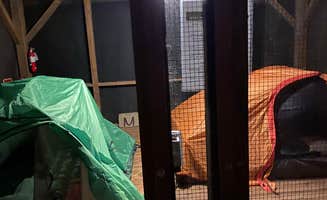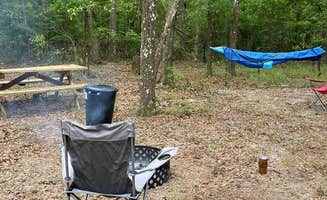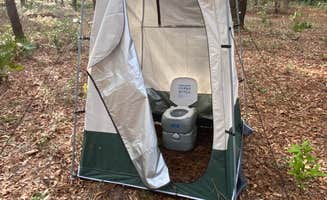The Suwannee River region near Jasper, Florida offers primitive and riverside tent camping options with varying levels of access and amenities. This area sits at the northern edge of Florida where the Suwannee River creates a natural boundary with Georgia before flowing southwest through Florida. During summer months, afternoon thunderstorms are common with temperatures regularly exceeding 90°F, while winter nights can drop into the 40s, creating ideal camping conditions from October through April.
What to do
Paddle the river segments: Between Woods Ferry River Camp and Holton Creek River Camp, paddlers can experience segments spaced about a day's journey apart. "One of 5 river camps along the Suwanee River and one of the nicest. This system of river camps currently is first come first served with no fee - but that could change soon and screened sleeping platforms may require reservations," notes one regular visitor.
Explore cave systems: For certified divers, the underwater cave networks near Peacock Slough attract international visitors. "The extensive submerged cave system is one of the most beautiful attracting divers from around the world," explains a reviewer. These limestone formations connect to the Floridan Aquifer system and maintain a constant 72-degree water temperature.
Swimming at springs: During warmer months, the natural springs provide relief from heat. At Lafayette Blue Springs, visitors enjoy "swimming in crystal clear spring water just steps away" from camping areas. Many springs connect to the Suwannee River, though water clarity can change with river levels.
What campers like
Screened sleeping platforms: At Peacock Slough River Camp, the elevated sleeping areas receive high praise. "Screened in pavilions with light/fan and outlets. Each one has a fire pit, grill and water spigot! Quite cute," reports one camper who paddled 65 miles on the Suwannee. These platforms typically accommodate 6-8 people and include small corner tables.
Convenient river access systems: Campers appreciate the thoughtful design of river camps. "Wheelbarrows to wheel your stuff from the river to campsite. Amazing!" notes a visitor to Peacock Slough. Woods Ferry includes "carts to help you get your gear up the high 200 yard, winding ramp to get to the camp."
Unexpected amenities: For primitive tent camping Jasper, Florida locations offer surprising comforts. "The sites are under the most beautiful live oaks and swimming in crystal clear spring water just steps away. Super pet friendly and clean bathhouse," says a Lafayette Blue Springs visitor. Another camper notes some sites even have "power, fire ring, and running water. Hot showers also."
What you should know
Water level variations: River conditions dramatically affect access and camping experience. During high water periods, "access to stairs to take out and to camp can be difficult" and beaches may disappear completely. Campers should check river levels before departing, especially during Florida's rainy season.
Wildlife awareness: Secure food and equipment at all camps. "There are raccoons and other nocturnal creatures and an occasional bear passing through," warns an Adams Tract camper. Visitors regularly encounter wildlife throughout the region.
Limited cell service: Many tent camping sites near Jasper have minimal connectivity. At East Tower Hunt Camp, "there is no cell service" according to a recent visitor, making emergency communications difficult. Consider bringing satellite communication devices for remote locations.
Seasonal insect activity: Mosquitoes present significant challenges during warmer months. At Big Camp Hunt Camp, a visitor notes it's "nice and secluded, great for overlanders. Only downfall is the mosquitos." Spring and fall camping provides more comfortable conditions with fewer insects.
Tips for camping with families
Select camps with amenities: For tent camping with children, river camps offer the most comfortable experience. "Our outfitter offers a service to shuttle gear to site for a fee," mentions one Dowling Park visitor, which can simplify logistics with children.
Consider accessibility factors: Some river camps require substantial effort to reach. "The hard part was moving all our boats from the river up to where the van could pick us up. Long ramp in the pouring rain – not fun," reports a Woods Ferry camper caught in a storm front.
Plan for afternoon weather: Summer thunderstorms often develop by mid-afternoon. "We stay here at least 2 times a year as the Suwannee River river camps are spaced a days paddle apart and are wonderfully convenient (especially in summer when afternoon rains come daily and bugs are everywhere)," advises a regular visitor.
Tips from RVers
Tent-focused infrastructure: Most campsites in the Suwannee River Wilderness Trail primarily accommodate tent campers with limited RV facilities. Twin Rivers State Forest Primitive Campsites does offer some sites with electric hookups, water hookups and sewer connections, but these are exceptions rather than the norm in this region.





